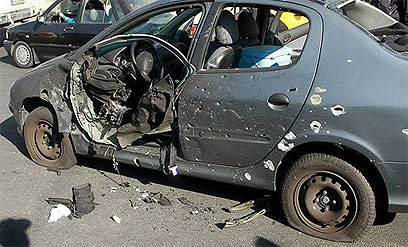
In detailed letter, army instructs reserve officers to take extra precautions in Israel and abroad following assassination of nuclear scientists in Tehran. Officers ordered to avoid travelling on same traffic routes, shopping for groceries at same place
Israel Defense Forces reserve officer are urged to take extra precautions following the assassination of Iranian nuclear scientists: A detailed letter was sent Wednesday to a series of reserve officers, instructing them how to conduct themselves inIsrael and abroad.
The officers were asked to replace the supermarket they shop in frequently and to avoid travelling on regular routes. The procedures are aimed at thwarting an attempt by terrorist organizations to target these people, some of whom are still holding key roles in the military reserve force.
The letter, signed by Brigadier-General Kobi Barak, head of operations at the General Staff, explains that the increased fear stems from recent events, including thedeath of Iranian nuclear scientists in Tehran last month.
Barak also mentioned the February 2008 assassination of seniorHezbollah commander Imad Mugniyah in an explosion in Damascus, after which the Shiite group's Secretary-GeneralHassan Nasrallah vowed to avenge his death.
He noted that last month a pro-Palestinian organization published the personal details of some 200 officers and soldiers who took part in Operation Cast Lead, claiming that they were war criminals. Some of them even had threatening letters sent to their homes.
 Fear rising. Scene of Tehran assassination
Fear rising. Scene of Tehran assassination
Brigadier-General Barak called on the officers to brief their family members on the situation and pay attention to any suspicion vehicles, unusual activity or unknown people wandering near their homes.
The officers were also asked to "disrupt their routine," which Barak defined as "our weak point".
According to the document, the officers must avoid repeating activities over time, like travelling on the same traffic routes or shopping for groceries at the same place.
The letter advises the officers to check their cars in the morning before driving them, examine their mail and avoid accepting unexpected packages. When they are abroad, the officers are urged not to stay in hotels defense officials are not familiar with and to reserve rooms which are not located next to the elevator or staircase.
Officers who received the letter on Wednesday morning told Ynet that these were the most detailed instructions they had ever received in terms of personal safety.
Israel Defense Forces reserve officer are urged to take extra precautions following the assassination of Iranian nuclear scientists: A detailed letter was sent Wednesday to a series of reserve officers, instructing them how to conduct themselves inIsrael and abroad.
The officers were asked to replace the supermarket they shop in frequently and to avoid travelling on regular routes. The procedures are aimed at thwarting an attempt by terrorist organizations to target these people, some of whom are still holding key roles in the military reserve force.
The letter, signed by Brigadier-General Kobi Barak, head of operations at the General Staff, explains that the increased fear stems from recent events, including thedeath of Iranian nuclear scientists in Tehran last month.
Barak also mentioned the February 2008 assassination of seniorHezbollah commander Imad Mugniyah in an explosion in Damascus, after which the Shiite group's Secretary-GeneralHassan Nasrallah vowed to avenge his death.

Officers who received the letter on Wednesday morning told Ynet that these were the most detailed instructions they had ever received in terms of personal safety.
"Instructions have been given in the past, but they were never so detailed and extensive," one of them said. "This forces all of us to act in a wise and calculated manner in order to avoid unusual incidents."

